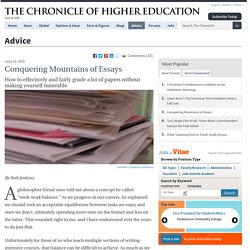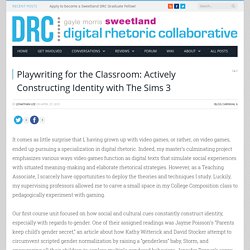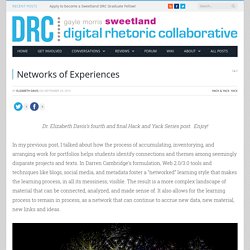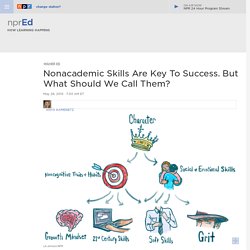

Module II: Generative Knowledge Interviews: An Overview. Conquering Mountains of Essays - Advice. By Rob Jenkins A philosopher friend once told me about a concept he called "work-work balance.

" As we progress in our careers, he explained, we should seek an acceptable equilibrium between tasks we enjoy and ones we don’t, ultimately spending more time on the former and less on the latter. That sounded right to me, and I have endeavored over the years to do just that. Unfortunately for those of us who teach multiple sections of writing-intensive courses, that balance can be difficult to achieve. As much as we enjoy teaching — and maybe even advising, class prep, and other aspects of our jobs — there’s simply no escaping the part most of us don’t enjoy, or at least enjoy less: grading all those essays. I have simply resolved not to let it. In sharing this approach, I am breaking one of my Cardinal Rules for Surviving at a Two-Year College: Don’t tell anyone what you do, because someone will tell you that you can’t do it.
Change your bad attitude about grading. Stagger due dates. Playwriting for the Classroom: Actively Constructing Identity with The Sims 3. It comes as little surprise that I, having grown up with video games, or rather, on video games, ended up pursuing a specialization in digital rhetoric.

Indeed, my master’s culminating project emphasizes various ways video games function as digital texts that simulate social experiences with situated meaning-making and elaborate rhetorical strategies. However, as a Teaching Associate, I scarcely have opportunities to deploy the theories and techniques I study. Luckily, my supervising professors allowed me to carve a small space in my College Composition class to pedagogically experiment with gaming. Our first course unit focused on how social and cultural cues constantly construct identity, especially with regards to gender. To add to the provocative atmosphere, I informed my class that for the presentation portion of the unit, they could play a video game. Setting Up the Simming I encouraged them to maintain a continual reflective mindset as they created their Sims. Party Three: Andrew. The First 20 Hours - How to Learn Anything: Josh Kaufman at TEDxCSU (05:54)
Networks of Experiences. Dr.

Elizabeth Davis’s fourth and final Hack and Yack Series post. Enjoy! In my previous post, I talked about how the process of accumulating, inventorying, and arranging work for portfolios helps students identify connections and themes among seemingly disparate projects and texts. In Darren Cambridge’s formulation, Web 2.0/3.0 tools and techniques like blogs, social media, and metadata foster a “networked” learning style that makes the learning process, in all its messiness, visible. The result is a more complex landscape of material that can be connected, analyzed, and made sense of. Internet Map By Matt Britt [CC-BY-2.5 ( via Wikimedia Commons At the beginning of this series, I talked about my dissatisfaction with the digital research projects created by students in my course on writing for the Web and the source of that unhappiness being less the work itself than the sense that something was missing.
The problem, of course, is what such a research project might look like. Nonacademic Skills Are Key To Success. But What Should We Call Them? : NPR Ed. More and more people in education agree on the importance of learning stuff other than academics.

But no one agrees on what to call that "stuff". There are least seven major overlapping terms in play. New ones are being coined all the time. This bagginess bugs me, as a member of the education media. It bugs researchers and policymakers too. "Basically we're trying to explain student success educationally or in the labor market with skills not directly measured by standardized tests," says Martin West, at the Harvard Graduate School of Education.
West studies what he calls "non-cognitive skills. " The problem isn't just semantic, argues Laura Bornfreund, deputy director of the education policy program at the New America Foundation. As Noah Webster, the great American lexicographer and educator, put it back in 1788, "The virtues of men are of more consequence to society than their abilities; and for this reason, the heart should be cultivated with more assiduity than the head.
" Writing-101-Syllabus-Fall-20141.docx. Self[ie] Awareness. A resource for faculty and students to practice character presentation through the selfie.
![Self[ie] Awareness](http://cdn.pearltrees.com/s/pic/th/self-ie-awareness-108937470)
Joining the Conversation Teacher Resource.